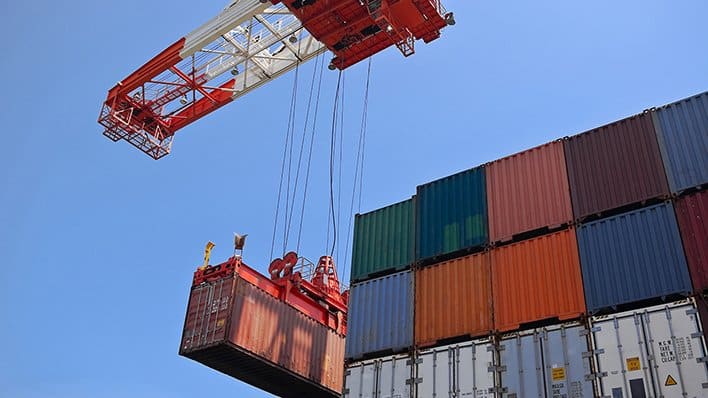Los Miembros adoptan un proyecto de Decisión para mejorar los datos sobre los aranceles
La Decisión, adoptada en la reunión formal del Comité de Acceso a los Mercados del 28 de mayo, ayudará a los Miembros a simplificar la recopilación de estos datos y a mejorar los procedimientos anteriores

Los Miembros de la OMC llegaron a un consenso relativo a la adopción de una nueva Decisión sobre las Modalidades y el Funcionamiento de la Base Integrada de Datos (BID), principal fuente de datos de la OMC sobre los aranceles y las importaciones. La Decisión, adoptada en la reunión formal del Comité de Acceso a los Mercados del 28 de mayo, ayudará a los Miembros a simplificar la recopilación de estos datos y a mejorar los procedimientos anteriores, adoptados en 1997. Los Miembros también examinaron numerosas preocupaciones comerciales.
The WTO’s Integrated Database (IDB) is the only tariffs and import database based on official information supplied by members. It contains data supplied annually by members concerning their most-favoured nation (MFN) tariffs as well as their annual imports by tariff line and country of origin. Some members also provide information on the preferential duties under free trade agreements (FTAs) and/or preferential schemes for developing countries are available for some members. These data are made available in different formats and are also shared with other international organizations such as the International Trade Centre (ITC) and the United National Conference on Trade and Development (UNCTAD). Transparency through timely and accurate tariff and import information is of great importance to WTO members and trade operators.
The 17-page decision was agreed in record time. The Market Access Committee first agreed to explore the possibility of revisiting the IDB decision at its meeting of 9 October 2018 through an informal and open-ended discussion. A first draft was released at the beginning of April 2019 and approved in less than two months. The new decision consolidates existing rules and procedures currently spread across several different documents and decisions, which many members saw as one of the main obstacles in complying with IDB notification requirements. It seeks to better explain who must do what and when, including the interaction with other notification requirements, such as the transparency mechanism for preferential trade arrangements.
The new decision also seeks to better exploit new technological developments and to align the IDB with other notification requirements. For example, it authorizes the WTO Secretariat to establish bilateral agreements with members willing to automatically submit their data through their domestic servers if they so choose. It also authorizes the Secretariat to work with other international organizations to develop standards and tools to simplify such transmissions. Finally, the decision seeks to improve the WTO’s technical assistance in this area.
Enhancing transparency in applied tariffs
The Russian Federation submitted a paper which seeks to further enhance transparency in applied tariffs. It considers that the existing provisions have created a gap between the transparency mechanisms at the national and WTO levels. More concretely, while members have the obligation to officially publish at the national level each change to their tariffs, there is currently no obligation to notify those changes to the WTO beyond the annual notification of all duty rates, i.e. the WTO is not aware of what happens in between those annual notifications.
The Russian Federation proposed to address this issue within the framework of the Committee on Market Access and encouraged members to look into possible ways to enable traders to get acquainted with changes in tariff levels throughout the calendar year. The current system does not support predictable market access conditions and may create an obstacle to trade, in particular for small and medium-sized enterprises (SMEs) who often struggle to obtain this very basic information.
A total of 17 members took the floor to welcome this initiative or expressed readiness to explore further this issue – Australia, Canada, China, Chinese Taipei, Colombia, the European Union, Hong Kong China, India, Japan, Mexico, New Zealand, Paraguay, Singapore, South Africa, Switzerland, Thailand and the United States. Without transparency, businesses must operate in an uncertain environment, increasing risk and discouraging them from trading or from entering the market, some members said.
Some members noted that the appropriate level of advanced notice before implementing the tariff changes should also be considered, as a significant number of changes enter into force on the same date as publication, and suggested further exploring how members treat shipments in transit when they alter their applied tariffs. Other members expressed a word of caution on the initiative and noted that members’ capacity should also be taken into account. They recalled that some members are already struggling to comply with the current annual notification requirements and considered that no new notification burdens should be established.
Specific trade concerns (STCs)
Members addressed 13 specific trade concerns (STCs), one of them introduced as an item under «other business» by China to address the recent US ban on Huawei. On 15 May 2019, the United States issued an Executive Order on Securing the Information and Communications Technology and Services Supply Chain, barring US companies from buying or using telecommunications equipment and services provided by enterprises deemed to cause national security threats.
China voiced its deep concern that what it considers to be the repeated over-generalization of national security and the abuse of Article XXI of the General Agreement on Tariffs and Trade (GATT) by the United States has caused great concerns to the membership, adding that it puts the whole multilateral trading system at risk. China asked the US to notify without delay subsequent administrative measures to the WTO and said that it will use all available means to safeguard its national interests. China was of the view that not all issues related to the economy, or innovation and technology, can be equated with national security.
In its response, the United States invited interested members to find more information on the Executive Order through the different national websites or the Federal Register.
Members also discussed the negotiation of the future tariff-rate quotas (TRQs) by the European Union and United Kingdom as a result of Brexit. The issue was brought up again by the Russian Federation, which expressed «deep concern» with respect to the EU’s approach to TRQ negotiations under Article XXVIII of the GATT. The Russian Federation said that this approach could result in the reduction of market access opportunities for WTO members and rejected the TRQ apportionment methodology that had been proposed, urging the EU to provide a compensatory proposal. It also reiterated its concern regarding the EU’s intention to negotiate based on the draft rectification and modification of schedules submitted in October 2017, as they have not been certified and could result in errors with regards to the certified schedule of December 2016.
Six other members took the floor to note that they also disagreed with the EU-UK approach, because the proposed split would result in no in-quota access to either the UK or the EU-27 for some TRQs. For other products, these members said, the proposed split would likely result in reduced market access to the EU only as the UK’s draft schedule in the event of a no-deal Brexit indicates that it would not apply TRQs. More importantly, it reduced flexibility in terms of where the products could be exported.
As the world’s largest agricultural importer and exporter, the EU plays an essential role in balancing global markets, these members said, also pointing out that a significant proportion of the EU’s agricultural imports take place through TRQs and this balance is seriously put at risk by the EU proposal to reduce most of its 196 TRQ concessions which cover almost 400 tariff lines. These members urged the EU to use the Brexit extension of 31 October to arrive at a solution that is acceptable to all and does not leave any country worse off than under the EU’s current bound WTO commitments.
In its reply, the European Union highlighted that traders throughout the EU, including in the UK, were also affected by and concerned about the current uncertainty. That was why the EU and the UK had engaged jointly as early as October 2017 with other WTO members on the envisaged approach to apportion the WTO commitments that take the form of TRQs, the EU said. The key principle, according to the EU, is to maintain the existing level of market access to the EU-27 and the UK, and WTO procedures were strictly followed to that effect when launching Article XXVIII negotiations. The EU recalled that it had engaged in good faith with its partners, with a view to maintaining the same level of concessions and stressed that it would not accept inappropriate attempts to extract new concessions.
The Dominican Republic included a new trade concern regarding Jamaica´s new regulations banning single-use plastic products, voicing serious concerns about the restrictive effect in international trade of this measure and its compatibility with WTO obligations. The Dominican Republic considered that Jamaica violates the national treatment principle because it banned the importation of these products while, at the same time, granting authorization to domestic producers. The Dominican Republic added that Jamaica has not demonstrated that such restrictive measures are necessary or that it does not have other alternative means to achieve its objectives. Moreover, it stressed the new regulation has not been notified to the WTO and asked Jamaica to suspend it while the pertinent consultations with the interested members are carried out.
The United States joined the Dominican Republic in expressing concerns about Jamaica’s measures. While recognizing the unique waste management challenges that island nations face, the US asserted that environmental objectives can be best served while upholding national treatment obligations. If local capacity to recycle single-use plastics is unavailable, and the goal of such prohibitions is to prevent plastic leakage into the environment, meeting that goal would appear to depend on the equal application of policies to both foreign and domestic products, the US representative said.
Jamaica acknowledged the intervention of the Dominican Republic on this issue and said it will revert to the Committee after consultations in capital.
Other trade concerns brought up in the Committee on Market Access included Australia’s discriminatory market access prohibition on 5G equipment, China’s customs duties on certain integrated circuits, the enlargement of the EU to include Croatia, India’s duties on telecommunication and other products, India’s quantitative restrictions on certain pulses, Indonesia’s customs duties on telecommunication products, the selective tax on energy drinks, carbonated drinks and other products applied by three Gulf Co-operation Council (GCC) countries, and Mongolia’s quantitative restrictions on the importation of certain agricultural products.














